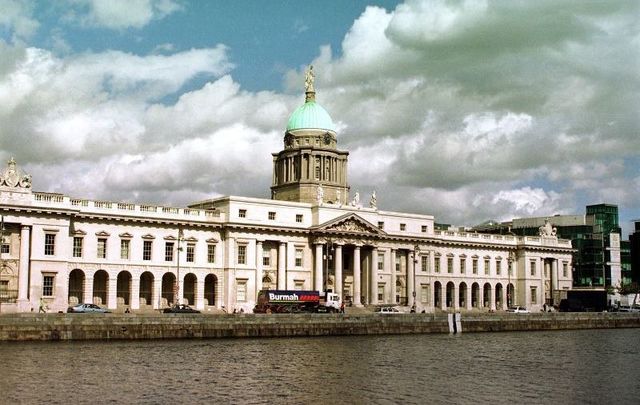Below is an excerpt from "Echoes of Their Footsteps Volume I" by Kathleen Hegarty Thorne, researched by Patrick Flanagan.
Americans staged their Boston Tea Party in 1773 to protest English taxation without representation. The Irish sent their own message a hundred years ago in April.
Read More: From window tax to hats - Taxing Ireland through history
The rebels fighting the forces of the British Empire at that time were determined, even under threat of death, to defy the overlords and take away their source of income from the Irish populace. Their continued efforts resulted in a Treaty fifteen months later establishing the Irish Free State.
Typical of similar actions all over Ireland, the Custom House/Tax Offices in various counties were raided. Records were taken and later destroyed. Sometimes the houses of tax collectors were also broken into. Destruction of civil records helped make it impossible for the British government to continue to rule the land.
Examples of raids:
■April Oldcastle, Co. Meath. Seven men raided the office in which the record keeper lived. When informed what the Volunteers wanted, he called out, “I will come down.” When the Volunteers explained their mission, he showed them the tax office, put out the light, wished them luck, and went back to bed while the Volunteers gathered all the paperwork (Witness Statement of Peter O’Connell, Kells, Co. Meath, pp. 3−4)
■3 April (Saturday night) Sligo town office was raided by Liam Pilkington, Jim Keaveney, and one other Volunteer (Sligo 1914−1921 A Chronicle of Conflict by Michael Farry, p. 196)
■ 3 April: Tralee, Co. Kerry, tax office (Tans, Terror and Troubles by T. Ryle Dwyer, p. 188)
■ 3 April: County Mayo’s Bonniconlon income tax office raided (They Put the Flag a- Flyin’ The Roscommon Volunteers 1916−1923 by Kathleen Hegarty Thorne, p. 476)
■5 April: Castlebar, Co. Mayo, office (They Put the Flag a-Flyin’ The Roscommon Volunteers 1916−1923 by Kathleen Hegarty Thorne, p. 476)
■5 April: South Mall and South Terrace offices in Cork city were burned
Read More: 100 Years of Bias - lingering questions from an Irish shooting in 1920
Some offices in Ireland were hit a month or so later. But the message was the same:
■12 May: Carrick-on-Shannon and Roscommon town offices were hit as was the Dungloe office in Co. Donegal, Downpatrick office in Co. Down, and twenty-six other offices in seventeen different counties (The Donegal Awakening by Liam Ó Duibhir, p. 136) and (“Clergyman Wounded by Raiding Party,” Irish Independent, 14 May 1920, p. 5)
■30 May: Ballyshannon customs office (The Donegal Awakening by Liam Ó Duibhir, p. 139)
■June: Graiguenamanagh, Co. Kilkenny. The Volunteers also demolished the local barracks the same evening (John Walsh Witness Statement, p. 12)
■28 June: The Custom and Excise offices in Athlone were raided by a small group of local IRA men: Seamus O’Meara, Tom “Con” Costello, Brian Mulvihill, Tom “Toby” Mannion, George Manning, Bob Ramsey, Ned and John Dowling, and Frank O’Connor (Frank O’Connor Witness Statement, p. 13)
“The IRA of 1920 was ‘a brotherhood of unity, defiant of death or despot.’” - No Other Law by Florence O’Donoghue, p. 7
Read More: No guns for the IRA? No problem!
This article was submitted to the IrishCentral contributors network by a member of the global Irish community. To become an IrishCentral contributor click here.




Comments